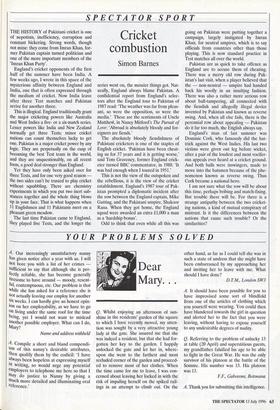SPECTATOR SPORT
Cricket combustion
Simon Barnes
THE HISTORY of Pakistani cricket is one of nepotism, inefficiency, corruption and constant bickering. Strong words, though not mine: they come from Imran Khan, for- mer Pakistan captain turned politician and one of the more important members of the `Imran Khan Party'.
England's cricket opponents of the first half of the summer have been India. A few weeks ago, I wrote in this space of the mysterious affinity between England and India, one that is often expressed through the medium of cricket. Now India leave after three Test matches and Pakistan arrive for another three.
This is illogical. England traditionally grant the major cricketing powers like Australia and West Indies a five- or a six-match series. Lesser powers like India and New Zealand normally get three Tests; minor cricket nations can count themselves lucky to get one. Pakistan is a major cricket power by any logic. They are perpetually on the cusp of becoming the best Test team in the world, and they are unquestionably, on all recent form, a good deal stronger than England.
Yet they have only been asked over for three Tests, and for one very good reason the two sides can't be trusted to play cricket without squabbling. There are chemistry experiments in which you put two inert sub- stances together and the whole thing blows up in your face. That is what happens when 11 Englishmen and 11 Pakistanis meet on a pleasant green meadow.
The last time Pakistan came to England, they played five Tests, and the longer the
series went on, the messier things got. Nat- urally, England always blame Pakistan. A confidential report from England's selec- tors after the England tour to Pakistan of 1987 read: `The weather was far from pleas- ant, so were the opposition, so were the media.' These are the sentiments of Uncle Matthes$, in Nancy Mitford's The Pursuit of Love: `Abroad is absolutely bloody and for- eigners are fiends.'
The absolutely bloody fiendishness of Pakistani cricketers is one of the staples of English cricket. 'Pakistan have been cheat- ing us for 37 years and it is getting worse,' said Tom Graveney, former England crick- eter turned BBC commentator, in 1988. `It was bad enough when I toured in 1951.'
This is not the view of the outspoken and the rebellious, it is the view of the cricket establishment. England's 1987 tour of Pak- istan prompted a diplomatic incident after the row between the England captain, Mike Gatting, and the Pakistani umpire, Shakoor Rana. When they got home, the England squad were awarded an extra £1,000 a man as a 'hardship bonus'.
Odd to think that even while all this was going on Pakistan were putting together a campaign, largely instigated by Imran Khan, for neutral umpires, which is to say officials from countries other than those playing. This is now standard practice in Test matches all over the world.
Pakistan are as quick to take offence as England are to accuse them of cheating. There was a merry old row during Pak- istan's last visit, when a player believed that the — non-neutral — umpire had handed back his woolly in an insulting fashion. There was also a rather more serious row about ball-tampering, all connected with the fiendish and allegedly illegal device invented by Pakistan and known as reverse swing. And, when all else fails, there is the perennial row about appealing — Pakistan do it far too much, the English always say. England's man of last summer was Dominic Cork, who famously did the hat- trick against the West Indies. His last two victims were given out leg before wicket, after a pair of the loudest and most vocifer- ous appeals ever heard at a cricket ground. And both balls were inswingers, made to move into the batsmen because of the phe- nomenon known as reverse swing. Thus Cork became a national hero.
I am not sure what the row will be about this time, perhaps bribing and match-fixing. But trouble there will be. For there is a strange antipathy between the two cricket- ing nations, a kind of mutual conspiracy of mistrust. Is it the differences between the nations that cause such trouble? Or the similarities?


































































 Previous page
Previous page